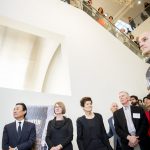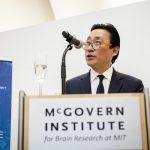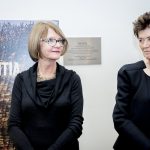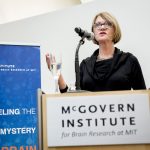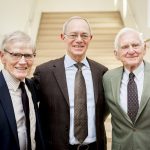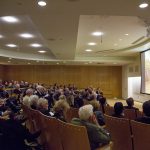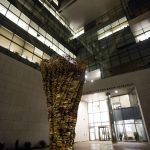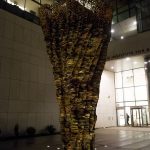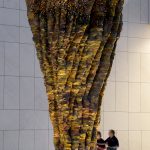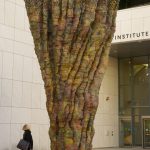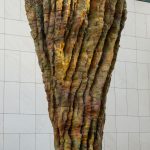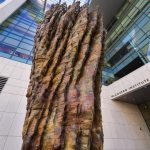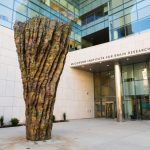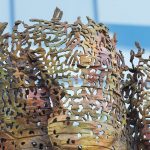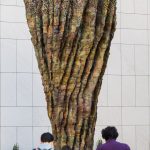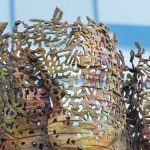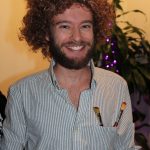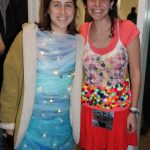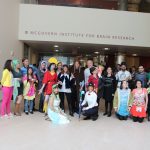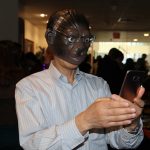“Visualizing AMPA receptor synaptic plasticity in vivo”
Yong Zhang, IDG/McGovern Institute, Peking University
November 8, 2016
Author: Julie Pryor
2016 Joint IDG/McGovern Institutes Symposium: Yina Ma
“Oxytocin and social adaption”
Yina Ma, IDG/McGovern Institute, Beijing Normal University
November 8, 2016
Artist Lecture: Ursula von Rydingsvard
On October 28, 2016, the McGovern Institute held a dedication ceremony for SCIENTIA, a monumental bronze sculpture located at the entrance to the McGovern Institute at 550 Main Street in Cambridge, MA. SCIENTIA, by Ursula von Rydingsvard, is a gift from Lore Harp McGovern and represents the 52nd piece of public art on the MIT campus. In this video, von Rydingsvard explains the creative process involved in making SCIENTIA.
Stanley Center and Poitras Center Joint Translational Neuroscience Seminar: John Gabrieli
October 11, 2016
Stanley Center and Poitras Center Joint Translational Neuroscience Seminar Series
Speaker: John Gabrieli, McGovern Institute for Brain Research at MIT
Title: Predictive Neuroimaging and Precision Medicine for Neuropsychiatric Treatments
SCIENTIA
The newest addition to MIT’s Public Art Collection is on permanent display at the entrance to the McGovern Institute for Brain Research. “SCIENTIA,” a monumental bronze sculpture by Ursula von Rydingsvard is a gift from Lore Harp McGovern and represents the 52nd piece of public art on campus. The sculpture was dedicated in a public ceremony on Friday, Oct. 28 at 5 p.m., followed by an artist talk. Photos of the sculpture and the dedication may be found below.
McGovern Institute 2016 Halloween Party
And the winner of this year’s costume contest (by popular vote) goes to Ruth Rosenholtz for her depiction of presidential candidate Donald Trump! See below for a full gallery of images from our annual Halloween party.
Monumental new sculpture commissioned for MIT’s McGovern Institute
The newest addition to MIT’s Public Art Collection is now on permanent display at the McGovern Institute for Brain Research at 550 Main Street in Kendall Square, Cambridge, Massachusetts. “SCIENTIA,” a monumental bronze sculpture by Ursula von Rydingsvard is a gift from Lore Harp McGovern and represents the 52nd piece of public art on campus. The new work will be dedicated in a public ceremony on Friday, Oct. 28 at 5 p.m., followed by a free artist talk at 6 p.m. in the Singleton Auditorium (Room 46-3002).
“’SCIENTIA’ represents that art and science are not separate entities,” says Lore Harp McGovern, co-founder of the McGovern Institute and a member of the Council for the Arts at MIT. “Art defines our humanity, advances our curiosity, and forces us to ask big questions — questions the McGovern Institute for Brain Research is trying to answer. ‘SCIENTIA’ invites you in.”
Von Rydingsvard’s “SCIENTIA” is among her most ambitious sculptures to date, at approximately 24 feet tall and over 17,000 pounds. In creating the work, the artist first produced a wood model in her studio using 4×4-inch cedar beams milled for the construction industry. Using circular saws and a range of cutting tools, she sliced, marked, and shaped the wood elements, then stacked them to create layers that were glued and screwed into place. The full-scale wood model was then transported to Polich Tallix Fine Art Foundry (founded by Richard Polich SM ’65), where the majority of the sculpture was sand cast while the delicate filigree sections were cast using the lost-wax technique. Von Rydingsvard patinated the bronze surface by hand with chemicals and a blow torch.
For over 30 years, von Rydingsvard has been making monumental sculptures that reveal the trace of the human hand and resemble objects and environments that echo the artist’s family heritage in pre-industrial Poland. The artist’s childhood was marked by the strain of living in eight different refugee camps over the course of five years. Her earliest recollections — of displacement and subsistence through humble means — infuse her work with emotional potency. Von Rydingsvard has built towering cedar structures, creating intricate networks of individual beams, shaped by sharp and lyrical cuts and fused together to form rich, dynamic surfaces. While abstract at its core, von Rydingsvard’s work takes visual cues from the landscape, the human body, and utilitarian objects — such as the artist’s collection of household vessels — and demonstrates an interest in the point where the human-made meets nature.
“Ursula von Rydingsvard’s commissioned piece for the McGovern is a fantastic addition to MIT’s great public art collection,” List Visual Arts Center Director Paul C. Ha says. “This powerful sculpture will inspire many and will be one of the signature pieces in our collection. We’re grateful for Ms. McGovern’s thoughtfulness and her generosity in helping us acquire this magnificent piece for MIT.”
From Cells to Cognition: Understanding Brain Function in Health and Disease
TITLE: “From Cells to Cognition: Understanding Brain Function in Health and Disease”
DATE: Tuesday November 8, 2016
TIME: 8:30am – 5:00pm
LOCATION: MIT Bldg 46-3002 (Singleton Auditorium)
QUESTIONS? Naomi Berkowitz | naomiber@mit.edu | 617.715.5396
Registration is now closed.
PROGRAM
8:30 am
Continental Breakfast Served in Atrium
9:00 am – 9:10 am
ROBERT DESIMONE | McGovern Institute
, MIT
Welcoming Remarks
Session I (Chair: TBA)
9:10 am – 9:50 am
BAILONG XIAO | IDG/McGovern Institute, Tsinghua University
In touch with the mechanosensitive Piezo channels: structure, ion permeation and mechano-gating
9:50 am – 10:30 am
JING YANG | IDG/McGovern Institute, Peking University
The mechanism underlying neuronal response to axonal injury
10:30 am – 10:45 am
Break
10:45 am – 11:25 am
JUN YAO | IDG/McGovern Institute, Tsinghua University
Ca2+ dependent synaptic vesicle cycling
11:25 am – 12:05 pm
YONG ZHANG | IDG/McGovern Institute, Peking University
Visualizing AMPA receptor synaptic plasticity in vivo
12:05 pm – 01:30 pm
Poster Session and Lunch in Atrium
Session II (Chair: TBA)
1:30 pm – 2:10 pm
GUOPING FENG | McGovern Institute, MIT
Thalamic reticular nucleus dysfunction in neurodevelopmental disorders
2:10 pm – 2:50 pm
HUAN LUO | IDG/McGovern Institute, Peking University
Serial-like sampling of visual objects during sustained attention
2:50 pm – 3:30 pm
XIAOHONG WAN | IDG/McGovern Institute Beijing Normal University
Investigating neural mechanisms of metacognition
3:30 pm – 3:45 pm
Break
3:45 pm – 4:25 pm
YINA MA | IDG/McGovern Institute, Beijing Normal University
Oxytocin and social adaptation
4:25 pm – 5:05 pm
BO HONG | IDG/McGovern Institute, Tsinghua University
Spatio-temporal organization and assembly of human cortical networks
5:05 pm – 6:05 pm
Reception 5th floor overlooking Atrium
Supported by Hugo Shong and the McGovern Institutes
Genome Editing with CRISPR-Cas9 (Chinese Translation)
A Chinese translation of an animation depicting the CRISPR-Cas9 method for genome editing – a powerful new technology with many applications in biomedical research, including the potential to treat human genetic disease. Feng Zhang, a leader in the development of this technology, is a faculty member at MIT, an investigator at the McGovern Institute for Brain Research, and a core member of the Broad Institute. Further information can be found on Prof. Zhang’s website at http://zlab.mit.edu.
Images and footage courtesy of Sputnik Animation, the Broad Institute of MIT and Harvard, Justin Knight and pond5.
Baby diapers inspired this new way to study the brain
TEDSummit June 2016
Neuroengineer Ed Boyden wants to know how the tiny biomolecules in our brains generate emotions, thoughts and feelings — and he wants to find the molecular changes that lead to disorders like epilepsy and Alzheimer’s. Rather than magnify these invisible structures with a microscope, he wondered: What if we physically enlarge them and make them easier to see? Learn how the same polymers used to make baby diapers swell could be a key to better understanding our brains.



